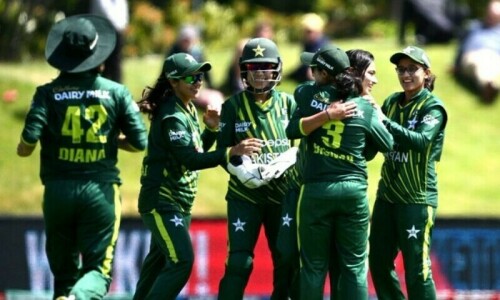DESPERATELY trying to find the missing weapon that slit the throat of a middleclass schoolgirl and her servant near Delhi, the sleuths lowered a man clad in just a loincloth into a gutter.
He would wade through the swarming filth to locate the knife or whatever was used in the horrific murders, hoping to step on something metallic with his trained feet. Newspapers carried pictures of this exercise underway.
What strikes me as unbelievable is that there was no comment in the media about the insensitive move by the police to get a fellow human being to walk neck-deep through the open sewer. This is the kind of humiliation that prisoners in Abu Ghraib might have been subjected to. But in this case an arm of the state was publicly abusing a man’s dignity, sanguine in the belief that it was how he earned his keep.
I doubt if this could be an aspect of India’s 2020 vision, not to speak of its military and economic prowess that enthuses the middle classes, the jingoistic foam around their mouth often whipped up by the same media that turned a blind eye to a fellow human’s misery.
Does the man have children who go to school, a wife who waits for him late into the evening for a meal? In a city crawling with mutating deadly viruses, does the man have a health cover to take care of the consequences of his work?
There are many reasons why these issues would not concern today’s media. One of them is the probability that the man who lowered himself into the gutter in Noida is a Dalit.
There is a surfeit of totally insensitive discussion in our newspapers and TV about whether a Muslim Dalit should have equal state protection as a Hindu Dalit, but what happens to the Dalits, Hindus or Muslims, other than their relevance in political or communal alignments, is mostly of little interest to the mainstream media. One of the reasons for this is obvious.
An entire caste of Dalits (at least 16 per cent of Indians) appears to have been precluded from what is surely a boom industry in a Murdochian era — the Indian media — not by overt communal design, mind you, but by subtle secular arguments for ‘merit’.
And the absence of comment on the daily occurrences of humiliation — not just in search of missing murder weapons but generally to keep the city’s overburdened sewers from choking — will remain a feature of our times as long as the so-called sentinels of public conscience remain inured to the traumas of Dalits.
The last time someone did a story about their participation in India’s media industry — it was a sensitive Brahmin editor who wrote it — there was not a single accredited journalist he could find from among their caste.
As we endure the Murdochian media spectacle, structured to indulge the lower instincts of the higher echelons of society, we find that canons of journalism have changed beyond recognition. In fact, journalists themselves have changed. There was a time when reporters of major dailies in the Indian capital would travel to their assignments in DTU buses, the old name for Delhi’s public transport.
They had difficulty renting a house because their ilk, being considered anti-system, was looked upon with suspicion. Few were willing to give their daughter’s hand in marriage to him if the man was found to be a journalist.
Now everyone and their neighbour want their children to become journalists, a euphemism for a glossy job as a newsreader, emulating role models who mesmerise their audiences with completely inconsequential inanities that pass for news or human-interest stories.
Dumbing down of news is being celebrated as evolved television. A certain owner of a major news channel began his career as a respected analyst and forecaster of election results. He is having to make do with the screening of religious serials along with other equally obscurantist programmes catering to the lowest common denominator. That’s a genuine case of Murdochian nightmare staring at us.
The consequences can be seen even in the murder case that so many channels are so riveted to. India’s National Commission for Protection of Child Rights has now issued a notice to a leading telefilms company after the Noida schoolgirl’s mother pleaded with them to prevent her daughter’s death from becoming a plot of a popular soap opera. “Stop commercialising our tragedy.” This is what the bereaved family has requested officially.
In the proposed version of the telefilm, the teenager is killed by her parents because of her relationship with a boy. It’s a storyline they’re unwilling to surrender without a fight. The television company says they were only making a serial on honour killing generally which may have resemblance to the media version of the case but had an entirely different plot.
Information Minister Priyaranjan Dasmunshi has been forced to intervene. He said that channels should not make business out of the Aarushi murder case, so called after the girl’s name. “Channels should not make a business out of this for TRP rating.”
The concern is very valid, but here too the focus is really kept sharply on class affinities. No one really seemed to be exercised about the picture of a naked man dredging the depths of filth to help solve a murder mystery.
If the Dalit men are plumbing the lower depths of their existence, their women can’t be far behind. I leave the readers with a rare report carried by the Business World magazine in its ‘Invisible India’ column on the lives of Dalits in Delhi.
Forty-year-old Manju, a manual scavenger employed by the urban municipality, described her daily routine and wages to this odd reporter who cared to talk to her.
“In the morning, I work from 6.00 am to 11.00 am cleaning the dry latrines. I collect the faeces and carry it on my head to the river half a kilometre away seven to ten times a day. In the afternoon I clean the gutters. Another bhangi collects the rubbish from the gutters and places it outside. Then I come and pick it up and take it one kilometre away.
My husband died 10 years ago. Since then I have been doing this. Today, I earn Rs30 a day (US$0.75). Nine years ago, I earned Rs16, then Rs22, and for the last two years it has been Rs30. But the payments are uncertain. For the last two months, we have not received anything.”
The writer is Dawn’s correspondent in Delhi.
jawednaqvi@gmail.com











































Dear visitor, the comments section is undergoing an overhaul and will return soon.